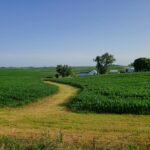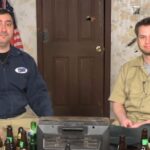5:45 a.m.
I tiptoe up the stairs even though I know my aunt and uncle are awake. They wake early. They are retired but have not stopped working. My uncle works in his garage restoring old cars. He measures and slices the metal pieces, re-paints the license plates with a stencil. My aunt works in the garden—looking after the asparagus, crowder peas and okra.
This morning, my uncle is in his recliner watching the news, which is exclusively covering what we are apparently calling “The Great American Eclipse.” I feel bad leaving so abruptly, but the traffic warnings are already starting, and this solidifies our departure time as a wise decision.
“Y’all be careful driving over that mountain,” he calls, and we disappear down the dark driveway.
8:30 a.m.
My grandma isn’t quite ready when we get there, so I show Steve around the property while she gets dressed for our breakfast date. We walk past reminders of my grandfather. The Martin houses he made in his wood shop. The old Coke machine from the service station. His old red pickup, which has been sitting in the yard for so long there is grass growing out of the bed. It makes me sad, this obvious indicator of the time that’s passed.
“When I was a kid, he would let me ride in the front seat with no seatbelt. Just to the Dairy Queen and back. We’d go pick up biscuits¾when Grandma and I didn’t make them, of course.”
10:30 a.m.
“I can show y’all the muscadine grapes if you have a minute.” They aren’t ripe yet, and the outsides are tough, not like regular grapes, but more like a mango. Steve pulls one apart anyway to taste the juice inside. We’ve never heard of these before. In return, Steve teaches my grandma a special way of recognizing the leaves of a dogwood tree by pulling them apart slowly and looking for thin, silk threads.
11:30 a.m.
“Up here is a Wal-Mart!” We’ve been driving for an hour and made decent time. The traffic is heavy but moving at about thirty miles an hour north on 23, a two-lane highway. Arriving at 11:30 in Clayton is better than we expected; getting to the middle of the totality band in time was as far as we’d planned ahead.
We make a sharp turn and drive over a curb into a small field between a Home Depot and a Wal-Mart, the parking lots of which are both already completely full. We aren’t alone in this choice. We’re one of about eight cars pulled up here, and many of these the occupants have run up a nearby gravel hill to get to the highest point around and as close to the main event as possible.
“We did it!” I exclaim, because we’re officially here for it. Here for the event that drove thousands across the country. This event that wasn’t planned by anyone or any organization, that has no admissions fee or token fan base. This is not the Super Bowl or a Beyoncé concert or the new Harry Potter book release or the Game of Thrones season finale. It is our world. It is doing what it would have done anyway, with or without us.
12:30 p.m.
By now Steve has fashioned us a tent made of blankets and supported by the top of the truck cab, a whiffle ball bat, and a shovel. We’re reading in our fashioned fort and sipping on the PBRs we had ready in the cooler. We bought groceries the day before, not knowing we’d end up next to a giant grocery store. I’m thankful because I have a place to use the bathroom. On the way in, I pass people with ice-pops and cold bottles of Coke, squinting as they step out back into the sun. There is so much bathroom traffic that a Wal-Mart employee is stationed by the ladies’ room line and is responsible for making sure the toilets are kept clean. Her nametag says Denise and she is singing “Amazing Grace.”
She wipes down the toilet seat in the stall I am about to enter and sings, “When we’ve been there ten thousand years, bright shining as the sun…”
I hope she gets a chance to step outside later to see the sun forebear to shine.
1:07 p.m.
“I can see it!!” The group of high school kids next to us have been the most excited of any of our tailgate neighbors. They arrived before we did; the public schools are out for the event. Our small field area has doubled in population. Cars jostle over to where the rough grass is knee-high; kids are lifted in parents’ arms and perched cross-legged on the rooftops of their vehicles. One of the teens in the high school group presses his paper glasses to his eyes and exclaims, “I guess it’s NOT a hoax!!” This makes me laugh out loud while scrambling for my own glasses and sitting up on the edge of the truck bed.
“A tiny bite of the sun is GONE!” shouts a small girl next to us, and so it is. The sun is being eaten. It’s barely noticeable, but it’s happening if you’re paying attention.
2:20 p.m.
A cool breeze passes over us. The clouds are gathering. The kids behind us are speculating about their billowing paths. If clouds are covering the sun during totality, it will not be visible. It will still get dark, but we will not see that ring in the sky. What a gamble.
“It’s going to be close.”
The sun looks like a sliver of moon now. Is it getting cooler because the clouds are gathering, or because the sun is disappearing?
I have read about the effects of a total eclipse. I am waiting for the changes to come. My eyes are peeled like muscadine grapes. I’m looking for what is different. I’m asking myself like a young teen after her first kiss, looking at herself in the mirror. Do I feel different now?
On the ground, we can see the shadows of each individual hair that the humidity has loosened out of my braid. I open up my hands and they look like shadow puppets; the sun is a flashlight set up by a child and pointed at the earth. Tiny waning crescents are projected through Steve’s blanket tent and onto our bare knees.
2:36 p.m.
Steve and I are standing in the truck bed. The excitement is palpable. The changing light is making us giddy. I can’t imagine sitting down. I’m looking around us more than I am looking at the sky. It feels like preparing to dive off a boulder into water you know to be ice-cold. Actually, it’s more like ascending the most terrifying hill on a rollercoaster. The gears are clicking and there’s nothing you can do to stop it. In a few moments, your stomach will drop out of your body.
2:37 p.m.
It’s noticeably darker now. The light is dimming. Later, Steve will compare it to the dimming feature some light fixtures have, like my parents use for when they want dinner by candlelight but don’t want the lights off completely.
“The Home Depot lights are on!” This is so funny to us. It’s the middle of the day but it is quickly becoming night. Steve points out a star.
There was a time that feels like long ago now, when Steve and I were sophomores in college. We were not in love then, but we often stayed late in the library together. Two night owls. I wrote better when it was late and quiet. The library closed at 2 a.m., and at 1:50 they turned all the lights out for a few seconds. I don’t know why we loved this moment. For a second, the whole floor was dark, and you could see out the windows over the big lawn, where only a few late-studiers or early-lovers were walking. They turned the lights out to let you know it was time to go. We started to pack up afterwards. Of course, we could have left at 1:45. It would have made no difference. But we always stayed until the lights blinked.
2:38 p.m.
The moon slides over the sun and it’s dark all around us. Everyone whoops and claps and some reach into their cars to honk their horns.
“If I had not read that it was the moon, I could have seen the sight a hundred times and never thought of the moon once,” wrote Annie Dillard about the 1979 solar eclipse. She was right—she usually is. The sun could have been covered by anything. A hubcap from my uncle’s auto shop, a Coca-Cola can, a shotgun shell, a frisbee. An unbaked biscuit, cookie cutter punched, on a marble cutting board. It could have been covered by a marble.
There is a sunset in front of us and a sunrise behind us. My mind uses all the prior knowledge of sunsets gained in twenty-seven years of life and tells me that the sun is on both horizons, sinking or rising, it doesn’t matter which. It’s over there on the horizon like I’ve seen all my life. I have to actively fight this assumption. I look at the ring of white light in the sky, miraculously free of cloud cover, without the protective glasses I checked and re-checked to make sure I had in the car, and tell myself That is the sun. It is dark now and the horizon is light but the sun is right there, hiding behind a biscuit.
2:40 p.m.
And then, it surfaces. The sun was holding its breath and now it’s gasping for air. The light comes sharp at first. It’s the slanted sun photographers crave, now coming directly from above. It’s a spotlight on all of us. The path of totality ran diagonally across the country like Broadway and we are standing center-stage, both the performers and the audience. We clap and cheer again because this is the curtain call, a standing ovation for being present. We all saw the curtain between earth and heaven rise and fall again.
3:00 p.m.
The parking lot is emptying and the clouds have covered what we so actively watched two hours ago. We don’t wait to see the sun return to normal. By now the light is normal, the heat is normal, the shadows are blurring and my heart rate is slowing. Steve and I sit in traffic for the next eight hours, but we continue to glance at each other every so often, our mutual understanding as bright shining as the un-eclipsed sun.

Caroline (Higgins) Nyczak (’11) lives in Brooklyn, New York, where she spends the vast majority of her time teaching English Language Arts. You may also find her at barre exercise classes or playing (and losing) at bar trivia. She continues to be inspired by the energy and diversity of New York City and the beauty of that certain slant of light.








